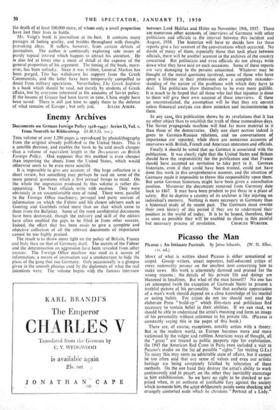Enemy Archives
THIS volume of over 1,200 pages is reproduced by photolithography from the original already published in the United States: This is a sensible decision, and enables the book to be sold much cheaper than a volume of equivalent length in the Documents on British Foreign Policy. One supposes that this method is even cheaper than importing the sheets from the United States, which would otherwise seem to be even more sensible.
It is impossible to give any account of this huge collection in a short review, but something may perhaps be said on some of the more general questions which a first perusal brings to mind. On the whole the impression produced by this volume is rather dis- appointing. The Nazi officials write with caution. They were obviously in an uncomfortable state of mind. There were, parallel to the Foreign Office machinery, personal and party sources of information on which the Fiihrer and his closest advisers such as Goering and Goebbels relied more than on that which came to them from the Ballplatz. Some of the most confidential documents have been destroyed, though the industry and skill of the editors have often enabled the gaps to be filled in from other sources. Indeed, the effort that has been made to give a complete and objective collection of all the relevant documents of importance cannot be too highly praised.
The result is to throw more light on the policy of Britain, France and Italy than on that of Germany itself. The secrets of the Fiihrer and the determination on aggression have been revealed from other sources. The Foreign Office machine was used as a source of information, a means of insinuation and a smokescreen to hide the plans of the gang that ran Germany. Only occasionally is a glimpse given in the smooth phrases used by the diplomats of what the real intentions were. The volume begins with the famous interview
between Lord Halifax and Hitler on November 19th, 1937. There are numerous other accounts of interviews of Germans with other politicians and officials in the interval between this incident and August, 1938. The historian will have to decide how far these reports give a fair account of the conversations which occurred. No doubt of many of them, especially those that took place between officials, there will be another account in the archives of the country concerned. But politicians and even officials do not always write down what they have said on such occasions. Some of these reports are very damaging to the persons concerned. Whatever may be thought of the moral questions involved, some of those who have spent a lifetime in their profession show a complete misunder- standing of the nature of the problems with which they have to deal. The politicians show themselves to be even more gullible. It is much to be hoped that all those who feel that injustice is done to them will give their own account of these interviews. If these go uncontradicted, the assumption will be that they are correct unless Historical analysis can show mistakes and inconsistencies in them.
In any case, this publication shows by its revelations that it has no other object than to establish the truth of these tremendous days. The Soviet propaganda machine will find far more material in it than those of the democracies. Only one short section indeed is given to German-Russian relations, and no conversations of importance are reported, while there are numerous accounts of interviews with British, French and American statesmen and officials.
Finally it should be noted that no German is associated with the publication. It was clearly right that the United States and Britain should have the responsibility for the publication and that France should have accepted an invitation to take part in it. German historians, even if they could have been trusted, could not have done this work in this comprehensive manner, and the situation of Germany made it impossible to throw this responsibility upon them. But some German historians might have been given a consultative position. Moreover the documents removed from Germany date back to 1867. It may have been prudent to put these in a place of safety. But to deprive a country of its archives is like injuring an individual's memory. Nothing is more necessary in Germany than a historical study of its recent past. The Germans must rewrite their own history of this period if they are to understand their position in the world of today. It is to be hoped, therefore, that as soon as possible they will be enabled to share in this painful but necessary process of revelation. CHARLES WEBSTER.






























 Previous page
Previous page